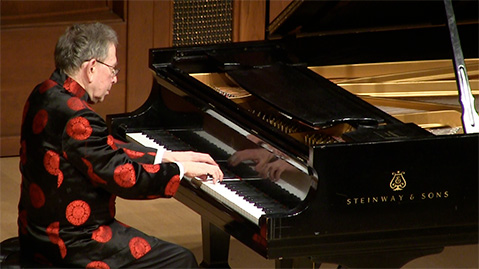Jerome Lowenthal and Conor Hanick Piano Recital
Music Academy Faculty Artists Recital Monday, July 11

This adventurous duo recital teamed Jerome Lowenthal, one of the Music Academy’s most distinguished senior faculty members, with Conor Hanick, a young pianist who comes to the Academy faculty riding a wave of recognition for his recent performances of challenging modern music.
Lowenthal, clad in a black shirt with giant red polka dots, delivered the evening’s first three pieces — the Adagio in B Minor, K. 540 of Wolfgang Amadeus Mozart, the Sonata for Piano, Op. 1 of Alban Berg, and the Scherzo No. 1 in B Minor, Op. 20 of Frédéric Chopin — continuously, as though they were one suite of music. The pianist wove these disparate compositional voices into a seamless whole — complex and meditative music yet approachable and even uplifting in a distinctly minor-key vein.
Hanick followed Lowenthal’s opening with two pieces by 20th-century French composers Olivier Messiaen and his pupil in composition, Tristan Murail. The choice reflected both the debt of gratitude owed by an acolyte to a mentor — the Murail piece is titled Cloches d’adieu, et un sourire … in memoriam Olivier Messiaen — and a shift from one musical tradition to another. Lowenthal closed the first half’s excursion to France by showing something of how he teaches, introducing and then providing brief narrative cues for the Aubade: Concerto choréographique of Francis Poulenc.
Hanick welcomed the audience back from intermission with two remarkable works that reflect on American history. The first, Charles Ives’s “Concord, Mass., 1840-60,” The Alcotts, is fairly well-known, even if it is not a part of the average concert pianist’s repertoire. The second, a piece by Frederic Rzewski called “Winnsboro Cotton Mill Blues” from the North American Ballads project, was a revelation, augmenting the sound collage and musical pastiche associated with Ives with extra-musical effects achieved through extended keyboard technique. In Hanick, Rzewski has found an ideal interpreter, comfortable (if that’s the word for it!) across the full range of his expanded compositional palette.
The finale was a suite for four hands by Samuel Barber. Based on popular dance forms of the early decades of the 20th century, Souvenirs revealed a side of that composer that’s rarely heard, and gave the two musicians an opportunity to share the stage and the keyboard as a parting gesture of collaboration and friendship.



